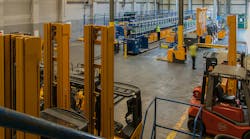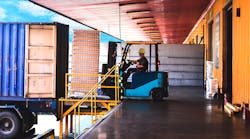| MHM Editorial Advisory Board Ted Augustine Roger Huff David Lockman, Thomas D.MacLean Tan Miller Laurie Nauman Brian O'Donnell Gregg Schwerdt |
Meet Our New Member
Thomas D. MacLean joins MHM's Editorial Advisory Board. MacLean is vice president, order fulfillment, Osborne International. As our newest board member, he gets first dibs at answering this month's question.
Q: Discuss your global sourcing strategies and how they, and your staffing, are affected by today's security concerns
A: MacLean: Osborn manufactures industrial brushes, both domestically and abroad. We have manufacturing locations in 10 countries and we source product from numerous other countries. The most significant impact of supply chain security measures, logistically, for us has been time. We generally allow more time to get material into the country, and we have increased our safety stocks accordingly. Inventory becomes the buffer to lead times, which are subject to change. Recently a critical shipment was held up by customs due to a slight inconsistency in paperwork. Delays of this nature are understandable in the post-9/11 world, but in order to ensure a smooth supply of product to maintain our business, more inventory is required. Additional inventory translated into more space required and eventually into additional pallet racking.
In some cases, depending on our size and volumes, lot sizes are also impacted. Shipping partial containers increases the chance of delays because the balance of the container may be shared by someone else's product. The aforementioned delay at customs was actually caused not by our documentation but by the documentation of another company that happened to be sharing a container with us. We now hold shipments until we can fill a freight container ourselves, which can adversely impact either the lead time or the lot sizes.
O'Donnell: We source our product from up to 40 countries around the world. What we are getting into for security purposes is having our overseas vendors get certified. This way we are able to ensure the procedures that they have in place.
Nauman: Ace is in the process of being certified with C-TPAT through U.S. Customs. When containers come through the port at customs, if you are a certified partner with them, the shipment would be expedited through customs.
Huff: We are doing a significant amount of business globally. The emerging markets of choice are China and India. When we make a decision to source in an emerging market, we put a lot of diligence in failure mode and effect analysis. If something happens at a dock or elsewhere in the supply chain, we must have contingency plans. From a purchasing standpoint, if it is high-risk commodities, we may dual source. We may have something sourced from an emerging market, and we may also have the tooling at a U.S. facility to produce the same product. We may not turn the equipment on, but at least it is tooled to be able to provide us with product.
Augustine: One of the things that we have done, especially with offshoresourced product, is to add variability to our safety stock algorithm based on the product's country of origin. In Brazil, we will take a look at when a carnival is going to happen and when all the religious holidays will happen, because they all relate to changes of supply that need to be in the pipeline to ensure a level of performance. We will consistently monitor and change that component of availability so that we are compensating for the pipeline fill.
Nauman: We sometimes use a subvendor for a product if we run into a crunch with something from overseas, especially when there's a store promotion. If we know we won't get the quantity into the country as planned, we'll work with another vendor, maybe-domestically, for that promotion. Schwerdt: The call-up of the National Guard changed our staffing in a way I've never experienced before. The fact that many were called to active duty for such a length of time is a huge change and an ongoing challenge.
Augustine: We have had to change our human resources policies as it relates to time of service and how they are reintroduced into the work force.
Huff: An individual who works within our organization and supports my function is in Iraq now. We were not able to bring anyone in to take over his responsibilities. I like to tell my organization, it is not about doing more with less; it is about re-evaluating the work that you do. What's value added and what's not value added, and see whether we can eliminate some waste. Our company fully supports volunteerism and we will have a job for our people when they come back from service, but it is a challenge for us if it involves many people.


